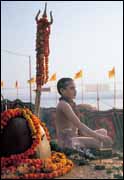


|
|
|
When Hindus die, first they go to Kashi, then ascend to heaven. Nobody has told me this, I have worked it out myself. Some reach Kashi before they are dead, their bodies, still breathing, brought to the rivers banks, for a last look at the world before their death. Their ascent to heaven is even faster. In the old days, the Italian tourist department had an advertisement slogan for Naples -- See Naples And Die. I have made one trip to Benares, and that is now many years back. And I did not go there to die, I went there to see the place. That is when I saw the bodies on the river bank. On a grey dawn, wrapped against the January North India cold in a poor man's rags, they looked mummified. Some of them had not survived the night. Some had, waiting for the first blush of a new day, before giving up life. I was returning from Nepal, walking across the mountains via Chisapani Gadi (Sweet Water) and Bhimpedi, then through Raxaul and Bihar to Benares and the banks of the Ganga. Part of the way had been trod by Gautama Buddha, the rest by Hindu sages. It was a mystic ambience, if I could think of it as anything oher than a dry and dusty part of the country. My first task was finding lodgings, and that was easy. Banaras must be having more than a thousand lodging houses, set up by religious trusts. Staying in most of these is absolutely free for the tired pilgrim, provided he can establish some connection with the trust, however vague it may be. Otherwise, there is always the large common waiting hall of Varanasi Station to spread your `bistra' on and sleep. But to return to the ghats where the bodies are cremated, they must be the cheapest cremations in the world. The Bombay Municipal Corporation's cremations are also cheap -- be happy that dying is cheap in India. Tourists see the bodies being burnt from a boat mid-stream. They stand on the deck and say, "There's a body burning." But Banaras is more than death, it is life. And its streets throb with it. I stayed in Benares for a little under a week, abandoning the dharamshalas after the first night and living at the railway station. It was less complicated, and, in the mornings, I could get up and go straight across to a milk and jalebi shop. Everywhere there were people, almost all of them, except the traders, were visitors, and all of them were pilgrims. This was the first and last time they would come to Benares, and they made the most of it by roaming about day and night. You talk of Bombay not sleeping. It is Banaras, the city that does not sleep. - Busybee
|

Home Page
About the mag
Subscribe
Advertise
Contact Us
